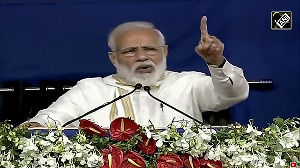Facing sustained criticism for its continuing dependence on foreign weaponry, the ministry of defence is finalising an ambitious policy for building up India's defence industry, both public and private. The MoD Secretary for Defence Production, R K Singh, has said that the country's first-ever defence production policy mandates that weaponry and military systems will be identified several years into the future, to allow Indian companies the time needed to develop and manufacture them. The identified systems will be allocated to specific Indian defence companies as development projects. The MoD will lay down clear time targets and provide 80 per cent of the cost that will be incurred.
"We have consulted the Army, Navy, Air Force, the Defence Research and Development Organisation, academia, Federation of Indian Chambers of Commerce and Industry, Confederation of Indian Industry and Assocham and noted their comments," says R K Singh.
"The new policy will come up before the Defence Procurement Board for consideration on June 11. Then the Defence Acquisition Council (the ministry's apex body on equipment acquisition) will clear it. Within two to three months, the new policy will be implemented."
The current rulebook for defence procurement -- the Defence Procurement Policy of 2008 (DPP-2008) -- already lays down a 'Make' procedure, which allows the MoD to allocate and fund projects through Indian industry. However, this has not yet led to any domestic orders for defence equipment, partly because equipment requirements have never been identified in advance, to give Indian industry the lead-time to develop them.
Pointed to this fact, the Secretary for Defence Production asserted, "But now it is going to happen. We have to make it happen, because now our industry has the strength. It is interested. We will ensure that the 'Make' procedure becomes very friendly. More and more equipment will now come into the 'Make' procedure."
Explaining the working of the new policy, Secretary R K Singh says Indian defence companies will be encouraged to register their technological capabilities in an MoD databank. When a need is anticipated for the army, e.g. a futuristic Main Battle Tank, the MoD will survey the industry and identify at least two major companies, to which it will award development contracts. These two prime contractors, working with a tailor-made consortium of companies, will develop a separate tank prototype and the MoD will select one, or even both, for mass production.
A similar system of competitive development contracts is followed by the US defence establishment.
The new Defence Production Policy is rooted in the MoD's realisation that its longstanding acquisition model of building weaponry in India, through Transfer of Technology, has failed to generate indigenisation. Real indigenisation, the MoD now believes, comes from designing weaponry, not just manufacturing foreign designs.
"Look at what has happened historically," says Singh. "The (Indian defence) industries which came up, with some exceptions, are manufacturing products that were designed abroad, not here. Our industry has been in the habit of taking transfer of technology and building on licence until the product dies a technological death. There is no expenditure on R&D and no technology absorption. And since the most important components come from abroad, the vendor can turn off the switch any time. If India wants to emerge as a world power, we have to start developing our own products. That is what our industry will have to learn in partnership with the MoD."
Indian private companies are treating the new policy with some scepticism. "The MoD has always manipulated policy to favour the defence public sector undertakings, which are the main beneficiaries of the old ToT practice," points out the CEO of a private Indian company that is active in defence. "Throwing out ToT and demanding real R&D will leave the DPSUs in the cold. Then we'll see whether the policy stays or goes."








 © 2025
© 2025